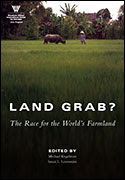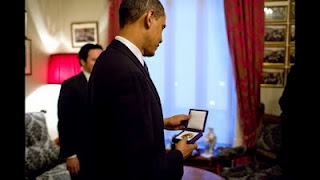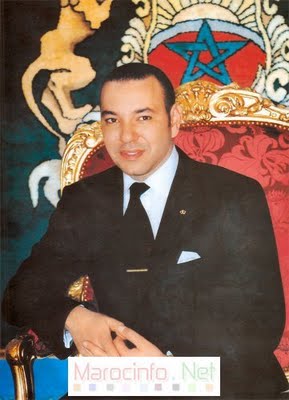-
Land Grab: Sacrificing the Environment for Food Security
January 27, 2010 // By Wilson Center StaffMORE According to the United Nations, 74 million acres of farmland in the developing world were acquired by foreign governments and investors over the first half of 2009 – an amount equal to half of Europe’s farmland.
According to the United Nations, 74 million acres of farmland in the developing world were acquired by foreign governments and investors over the first half of 2009 – an amount equal to half of Europe’s farmland. -
Eye On
Watch: Janani Vivekananda on Climate Change and Stability in Fragile States
At International Alert, the starting point for thinking about how climate change affects stability is recognizing that climate change will interact with and amplify existing social, economic, and political stressors in fragile communities, said Janani Vivekananda in this interview with the ECSP.MORE
“Rather than climate change being this single, direct causal factor which will spark conflict at the national level,” Vivekananda said, these stressors “will shift the tipping point at which conflict might ignite.” In places that are already weakened by instability and conflict, climate change will simply be an additional challenge.
To address this additional challenge, Vivekananda said two things must be understood about the effects of climate change on fragile states: 1) Environmental, social, economic, and political stressors will be most evident at the household and community level; and 2) Those stressors are interrelated.
“You can’t address one of these things in isolation from the others. You have to understand how they all interact together to be able to respond appropriately,” she said. “We can’t think about food security, for example, without thinking about land degradation.” In addition, responses need to be relevant to their context, and that context “can only be understood through very sub-national, context-specific evidence.” Vivekanada explained that this kind of evidence can only come from a “bottom-up” approach, which should be coordinated as part of a broader effort.
For more on the connections between climate change and stability, see The New Security Beat’s summary of “Connections Between Climate and Stability: Lessons From Asia and Africa,” with Janani Vivekanada, Jeffrey Stark of the Foundation for Environmental Security and Sustainability, and Cynthia Brady of USAID speaking at the Woodrow Wilson Center on May 10. -
Book Preview: ‘Environmental Politics: Scale and Power’
February 1, 2011 // By Shannon O’LearThe cover of my book, Environmental Politics: Scale and Power, shows two cows casually rummaging through piles of garbage on the streets of a city somewhere in India. It’s a colorful, but disturbing, image. Why not show cows in their “natural” setting, say, in a Kansas pasture? Who let them into the street? Why are they eating garbage? The image is symbolic of what the book aims to achieve: to get us out of our comfort zones in thinking about environmental issues and challenge us to reconsider how we think about issues like climate change, energy, food security, garbage, toxins, and resource conflicts.MORE
The book draws from my experience teaching environmental policy, environmental geopolitics, international conflict, and human geography. It starts by asking some fundamental questions: What exactly is “the environment” anyway? Is there any part of the world that is completely untouched by human actions? How do different forms of power selectively shape our understanding of particular environmental issues (while obscuring other issues from our view)?
The book draws on the idea of the “Anthropocene” – a new geologic era characterized by irreversible, human-induced changes to the planet. Because these changes (which in large part have already occurred) are irreversible, Anthropocene-subscribers argue we should focus our efforts on mitigation, adaptation, and coming to terms with the realities of the environment as it is, rather than something that must be returned to some previous or “normal” state.
Our understanding of environmental issues is shaped by various types of power – economic, political, ideological, and military – and therefore tends to be limited in terms of spatial scale. Why do we tend to think of climate change as a global phenomenon instead of something we might experience (and contend with) locally? Is food security something we should be mindful of when we make individual choices about food? We tend not to discuss what happens to our garbage, but everyone knows about recycling, right?
Environmental Politics: Scale and Power offers non-geographers an appreciation of how and why geographers think spatially to solve problems. Commonly accepted views of environmental issues tend to get trapped at particular spatial scales, creating a few dominant narratives. When we combine a spatial perspective with an inquiry into the dynamics of power that have influenced our understanding of environmental issues, we can more clearly appreciate the complexity of human-environment relations and come to terms with adapting to and living in the Anthropocene era.
Today’s environmental challenges can sometimes appear distant and immense, but this book aims to show how decisions we make in our day-to-day lives – from buying bottled water and microwave popcorn to diamond jewelry – have already had an effect on a grand scale.
Shannon O’Lear is a professor of geography at the University of Kansas and the author of Environmental Politics: Scale and Power. She has recently completed a research project examining why we do not see widespread or sustained environmental resource-related conflict in Azerbaijan, as literature on resource conflict would suggest.
Image Credit: Environmental Politics: Scale and Power, courtesy of Justin Riley and Cambridge University Press. -
Watch: Joan Castro on Resource Management and Family Planning in the Philippines
January 27, 2011 // By Wilson Center Staff“Sixty-percent of Filipinos live in the coastal areas,” said Joan Castro, executive vice president of PATH Foundation Philippines, Inc., in an interview with ECSP, and dwindling fish stocks are an issue across the archipelago. “With increasing population, the food that goes on the table for a lot of families in these coastal communities was an issue, so food security was the theme of the IPOPCORM project.”MORE
IPOPCORM (standing for “integrated population and coastal resource management”) was started in 2000 and ran for six years. It sought to address population, health, and the environment (PHE) issues together in rural, coastal areas of the Philippines.
“When we started IPOPCORM, there was really nothing about integrating population, health, and environment,” Castro said. IPOPCORM provided some of the first evidenced-based results showing there is value added to implementing coastal resource management and family planning in tandem rather than separately.
The PATH Foundation worked with local governments and NGOs to establish a community-based family planning system while also strengthening local resource management. The results showed a decrease in unmet need for family planning and also improved income among youth in the remote areas they worked in.
Today, Castro also serves as the PHE technical assistance lead of the Building Actors and Leaders for Advancing Community Excellence in Development (BALANCED) project – a USAID initiative transferring PHE know-how to regions of East Africa and Asia. -
Walker’s World: From Warming to Warring: A Review of Cleo Paskal’s New Book
January 15, 2010 // By Wilson Center StaffWilson Center Senior Scholar Martin Walker recently reviewed Global Warring: How Environmental, Economic, and Political Crises Will Redraw the World Map by Cleo Paskal, for his UPI column, “Walker’s World.”MORE
Excerpts: The Copenhagen summit showed that climate change is as much about geopolitics and power as it is about the weather. China‘s blunt refusal to accept any binding limits on its carbon emissions, despite the agonized pleas of small island governments facing extinction, demonstrated that this new aspect of the game of nations is going to be played as hardball.
The Copenhagen summit showed that climate change is as much about geopolitics and power as it is about the weather. China‘s blunt refusal to accept any binding limits on its carbon emissions, despite the agonized pleas of small island governments facing extinction, demonstrated that this new aspect of the game of nations is going to be played as hardball.
And yet, as Cleo Paskal argues in her pioneering new book “Global Warring,” China is also powering ahead on every aspect of climate change. While protecting its right to pollute (because it depends heavily on coal as its main homegrown energy source), China is using state subsidies to seize the lead in solar power manufacturing….But perhaps Paskal’s most striking story is the way that China is also seeking to become a major player in the arctic. China has acquired an icebreaker, a seat with observer status on the Arctic Council and its own arctic research base at Svalbard. (China also has two research bases in the Antarctic.) …
Paskal’s book is full of such vignettes, illustrating the way that climate change and the intensifying competition for resources is starting to change the nature of power politics. Paskal, a Canadian who is a fellow of London’s prestigious Chatham House think tank and a consultant for the U.S. Department of Energy, has been a pioneering scholar of the new terrain where climate change confronts national security, where geopolitics, geoeconomics and global warming all collide. It is not just rivalry for oil and gas supplies and water, but also for fishing rights and undersea mining and mineral rights that may well be up for grabs when some of the lowest-lying Pacific island countries disappear under the rising waves. …
“We need to start thinking about the legal and economic implications of these developments now, before we have to start tackling them in the middle of a crisis or a humanitarian emergency,” Paskal told a seminar at Washington’s Woodrow Wilson Center Friday. …
Paskal sees China and Russia taking these issues more seriously that the United States and Europe, and her book is not just a wakeup call for Western leaders but is also an arresting and original work on climate change, probably the most important book on the environment to be published this year.
“As pressure is put on food, water supplies and national boundaries, famine and war may become more frequent,” Paskal concludes. “This instability may make populations more tolerant of autocratic governments, especially nationalistic capitalist ones where the political, economic and military sectors combine to protect existing resources and aggressively try to secure new ones. China and Russia already have a head start on this model.” -
Nobel Pursuits: Linking Climate Efforts With Development, Natural Resources, and Stability
December 11, 2009 // By Geoffrey D. DabelkoMOREThe only mention of climate change in President Obama’s Nobel Peace Prize acceptance speech falls squarely in the climate and security context. He introduces the climate imperative by highlighting natural resources and development connections to stability and human well-being.
In these two paragraphs, the President identifies the key communities that must come together, first in dialogue and then in cooperation, but who so commonly don’t: development, natural resources, health, climate, peacebuilding, and security.It is undoubtedly true that development rarely takes root without security; it is also true that security does not exist where human beings do not have access to enough food, or clean water, or the medicine and shelter they need to survive. It does not exist where children can’t aspire to a decent education or a job that supports a family. The absence of hope can rot a society from within.
Photo: President Barack Obama looks at the Nobel Peace Prize medal at the Norwegian Nobel Institute in Oslo, Norway, Dec. 10, 2009 (Official White House Photo by Pete Souza).
And that’s why helping farmers feed their own people — or nations educate their children and care for the sick — is not mere charity. It’s also why the world must come together to confront climate change. There is little scientific dispute that if we do nothing, we will face more drought, more famine, more mass displacement — all of which will fuel more conflict for decades. For this reason, it is not merely scientists and environmental activists who call for swift and forceful action — it’s military leaders in my own country and others who understand our common security hangs in the balance. -
Missives From Marrakech: Growing and Slowing, and a Letter From the King
October 5, 2009 // By Gib ClarkeMORE Here in Morocco, where I am attending the IUSSP conference on population, if you never went to elementary school or if you married at a young age, you are likely to have more children.
Here in Morocco, where I am attending the IUSSP conference on population, if you never went to elementary school or if you married at a young age, you are likely to have more children.
A Bangladeshi couple is more likely to have a third child if they have 0-1 sons, but a European couple is increasingly likely to prefer daughters because they take better care of their aging parents.
Globally, a forthcoming Harvard study shows that the “Reproductive Health Laws Index”—which includes the legal framework governing abortion, condoms, IUDs, and birth control pills—can predict fertility (more liberal laws = fewer children) and potentially increase female participation in the labor force.
Such causes of population growth are favorite topics for demographers and family planning experts here at the conference, and were quite well attended. However, perhaps due to the large number of European attendees, the panels on this popular topic were empty in comparison to those examining aging, fertility decline, and migration—issues at the forefront of European policymakers’ agendas.
A Message From His Majesty
“One of the characteristic features of our population policy stems from our firm belief that [its] impact … cannot be determined in isolation from economic, social, cultural and political factors,” wrote Morocco’s King Mohammed VI in a welcome letter delivered to the conference, which also discussed aging, climate change, food security,natural resource scarcity, the economic crisis, and growing levels of income inequality.
Morocco is taking steps to tackle this complicated set of problems. The government has launched a National Initiative for Human Development to fight poverty and social inequalities, and help Morocco meet the Millennium Development Goals (MDGs). He also notes that the country’s “political and social reforms aimed at increasing the scope of democratic participation and ensuring the advancement of women.”
Like all leaders, Morocco’s will be measured not by his words—eloquent as these may be—but by his deeds and the country’s progress. Morocco has some work to do to reach the MDGs and other social and economic goals.
 A Publication of the Stimson Center.
A Publication of the Stimson Center.

 According to the United Nations, 74 million acres of farmland in the developing world were acquired by foreign governments and investors over the first half of 2009 – an amount equal to half of Europe’s farmland.
According to the United Nations, 74 million acres of farmland in the developing world were acquired by foreign governments and investors over the first half of 2009 – an amount equal to half of Europe’s farmland. 

 Here in Morocco, where I am attending the
Here in Morocco, where I am attending the 

